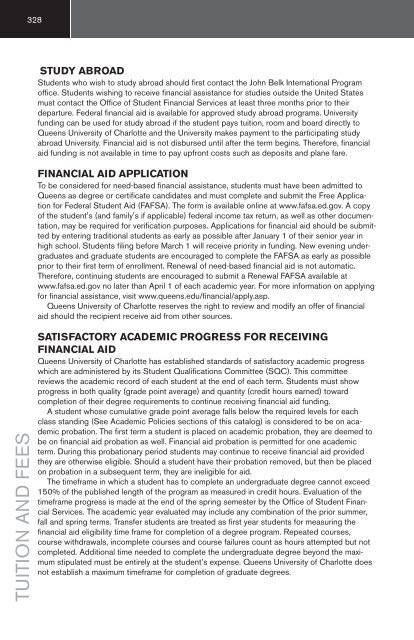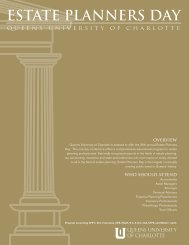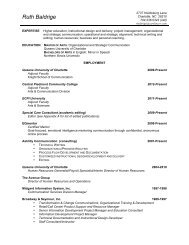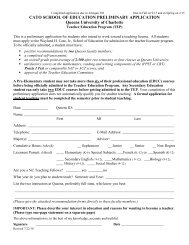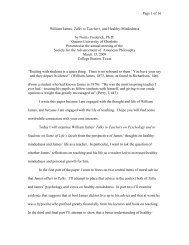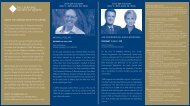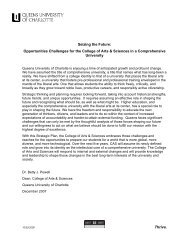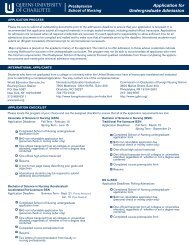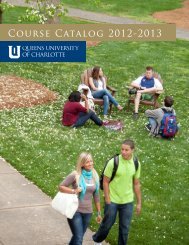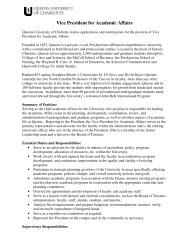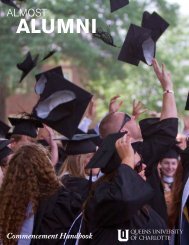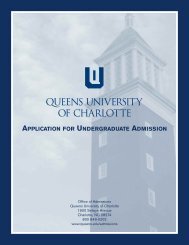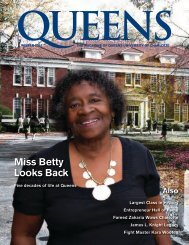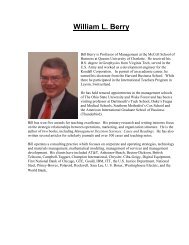2008-2009 Academic Catalog - Queens University of Charlotte
2008-2009 Academic Catalog - Queens University of Charlotte
2008-2009 Academic Catalog - Queens University of Charlotte
You also want an ePaper? Increase the reach of your titles
YUMPU automatically turns print PDFs into web optimized ePapers that Google loves.
328<br />
TUITION AND FEES<br />
STUDY ABROAD<br />
Students who wish to study abroad should first contact the John Belk International Program<br />
<strong>of</strong>fice. Students wishing to receive financial assistance for studies outside the United States<br />
must contact the Office <strong>of</strong> Student Financial Services at least three months prior to their<br />
departure. Federal financial aid is available for approved study abroad programs. <strong>University</strong><br />
funding can be used for study abroad if the student pays tuition, room and board directly to<br />
<strong>Queens</strong> <strong>University</strong> <strong>of</strong> <strong>Charlotte</strong> and the <strong>University</strong> makes payment to the participating study<br />
abroad <strong>University</strong>. Financial aid is not disbursed until after the term begins. Therefore, financial<br />
aid funding is not available in time to pay upfront costs such as deposits and plane fare.<br />
FINANCIAL AID APPLICATION<br />
To be considered for need-based financial assistance, students must have been admitted to<br />
<strong>Queens</strong> as degree or certificate candidates and must complete and submit the Free Application<br />
for Federal Student Aid (FAFSA). The form is available online at www.fafsa.ed.gov. A copy<br />
<strong>of</strong> the student's (and family's if applicable) federal income tax return, as well as other documentation,<br />
may be required for verification purposes. Applications for financial aid should be submitted<br />
by entering traditional students as early as possible after January 1 <strong>of</strong> their senior year in<br />
high school. Students filing before March 1 will receive priority in funding. New evening undergraduates<br />
and graduate students are encouraged to complete the FAFSA as early as possible<br />
prior to their first term <strong>of</strong> enrollment. Renewal <strong>of</strong> need-based financial aid is not automatic.<br />
Therefore, continuing students are encouraged to submit a Renewal FAFSA available at<br />
www.fafsa.ed.gov no later than April 1 <strong>of</strong> each academic year. For more information on applying<br />
for financial assistance, visit www.queens.edu/financial/apply.asp.<br />
<strong>Queens</strong> <strong>University</strong> <strong>of</strong> <strong>Charlotte</strong> reserves the right to review and modify an <strong>of</strong>fer <strong>of</strong> financial<br />
aid should the recipient receive aid from other sources.<br />
SATISFACTORY ACADEMIC PROGRESS FOR RECEIVING<br />
FINANCIAL AID<br />
<strong>Queens</strong> <strong>University</strong> <strong>of</strong> <strong>Charlotte</strong> has established standards <strong>of</strong> satisfactory academic progress<br />
which are administered by its Student Qualifications Committee (SQC). This committee<br />
reviews the academic record <strong>of</strong> each student at the end <strong>of</strong> each term. Students must show<br />
progress in both quality (grade point average) and quantity (credit hours earned) toward<br />
completion <strong>of</strong> their degree requirements to continue receiving financial aid funding.<br />
A student whose cumulative grade point average falls below the required levels for each<br />
class standing (See <strong>Academic</strong> Policies sections <strong>of</strong> this catalog) is considered to be on academic<br />
probation. The first term a student is placed on academic probation, they are deemed to<br />
be on financial aid probation as well. Financial aid probation is permitted for one academic<br />
term. During this probationary period students may continue to receive financial aid provided<br />
they are otherwise eligible. Should a student have their probation removed, but then be placed<br />
on probation in a subsequent term, they are ineligible for aid.<br />
The timeframe in which a student has to complete an undergraduate degree cannot exceed<br />
150% <strong>of</strong> the published length <strong>of</strong> the program as measured in credit hours. Evaluation <strong>of</strong> the<br />
timeframe progress is made at the end <strong>of</strong> the spring semester by the Office <strong>of</strong> Student Financial<br />
Services. The academic year evaluated may include any combination <strong>of</strong> the prior summer,<br />
fall and spring terms. Transfer students are treated as first year students for measuring the<br />
financial aid eligibility time frame for completion <strong>of</strong> a degree program. Repeated courses,<br />
course withdrawals, incomplete courses and course failures count as hours attempted but not<br />
completed. Additional time needed to complete the undergraduate degree beyond the maximum<br />
stipulated must be entirely at the student’s expense. <strong>Queens</strong> <strong>University</strong> <strong>of</strong> <strong>Charlotte</strong> does<br />
not establish a maximum timeframe for completion <strong>of</strong> graduate degrees.


